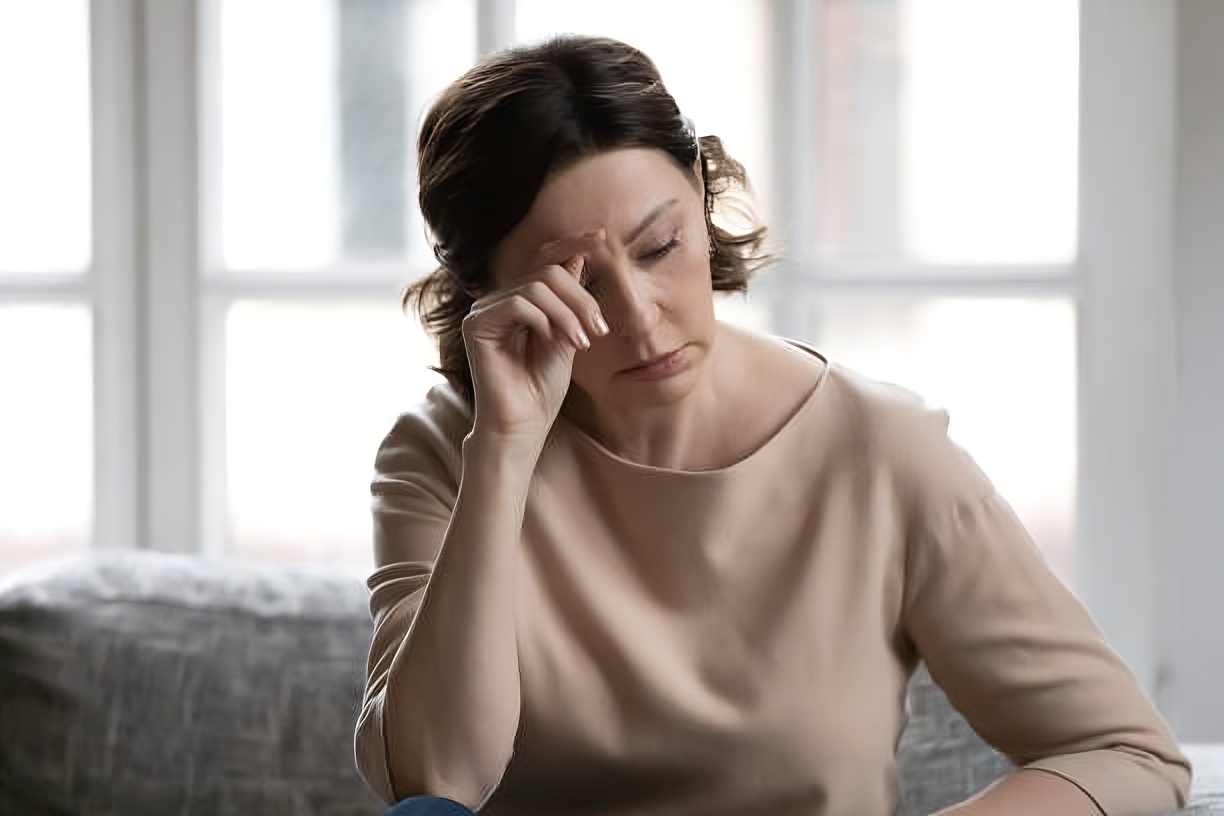
Menopause is a natural phenomenon associated with the reduction or cessation of natural female hormones from the ovaries often leading to varied symptoms of hot flushes, night sweats, brain fog, muscle and joint pain, low mood, irritability, reduced libido, and vulvovaginal dryness. By 2050, it is estimated that 1.6 billion women worldwide will be in the post-reproductive menopause phase with >75% reporting severe vasomotor symptoms that negatively affect their quality of life. Left unmanaged, menopausal symptoms can have a detrimental effect on women’s wellbeing, mental health, and their effective participation in the workplace.
While it is a natural stage in women’s life, many women are left suffering in silence due to inadequate medical care and support.
At LUNA, we believe in helping women to understand their individual health needs, optimise their quality of life and stay healthy on the longterm.
We focus on offering individualised and holistic management to women with menopause to help them access the treatments that best suit them, and offer consistent and longterm menopause care.
This includes exploring hormonal, and non-hormonal treatments options, lifestyle optimisation, supplement support, bone health surveillance.
We specialise in managing difficult and complex aspects of menopause management including:
Our experts have a track record in caring for women with complex medical history who require advanced and bespoke menopause management plans including those with history of cancer, autoimmune disease, clotting disorders, migraines, and cardiovascular disease.
We can help you to gain further information on your health status in the menopause stage of life offering a wide range of blood tests, detailed non-invasive ultrasound scanning, and advanced imaging such as mammograms and DEXA bone scans. Please see our price list for more information.


Menopause is a natural stage in life that every female will encounter sooner or later. Unfortunately, menopause is often over-medicalised and over-complicated leaving many women without appropriate help and support.
At LUNA we believe in the value of individualised management of menopausal symptoms that is guided by deep understanding of every individual specific health needs. We focus on providing the right advice and tools to help women with menopause explore their health priorities.
Venturing into the menopause is often associated with significant health changes including hot flushes, poor sleep, low libido, low energy levels, and low mood.
Many women with menopause are never informed about potential changes in this stage of life or how medical treatments can improve their quality of life. We have developed a comprehensive questionnaire that would help you to assess the impact of the menopause on your life and help you track improvement with treatments.
You can complete this questionnaire for free and download a copy to monitor your health
Hormone replacement therapy (HRT) is often offered as first line treatment for women with menopause. This however, on its own is not sufficient and often not appropriate to all women with menopause.
Several simple lifestyle interventions can help you to resolve many of the symptoms associated with the menopause and reduce the need for several medications.
We developed a comprehensive self-help guide with top 10 health tips to help you better manage your health in the menopause.
Most women in the menopause struggle to access reliable, safe, and effective hormone replacement therapy in the UK. The LUNA Menopause clinic specifically aims to simplify access to safe hormonal and non-hormonal treatments and support our patients with ongoing specialised menopause care.
If you are looking to start or change your hormonal menopause therapy, our doctors can help you to identify the right treatment for you. Our specialist pharmacy can arrange for home delivery following a virtual consultation to ensure you get your treatment rapidly and efficiently.




If you are troubled with menopause symptoms, help is easy to find. Our menopause experts can offer rapid and reliable health advice providing tailored treatments and comprehensive clinical care. We offer easy access to hormonal and non-hormonal treatments for the menopause with simple home deliver.
Menopause, also known as “the change of life,” is a natural and inevitable phase in a woman’s life. It refers to the point in time 12 months after her last period, signifying a significant transition that marks the conclusion of her reproductive age and the commencement of a new chapter.
There is no specified age for menopause, but it typically occurs between 45 and 55 years of age. Menopausal age is influenced by genetic factors, overall health, and lifestyle. While some women experience menopause early, others may go through it later in life.
Several changes in the levels of hormones in the body manifest this transition to post-reproductive years. Some of the key players are:
Oestrogen levels fluctuate during menopause. It is a primary female sex hormone. The ovaries produce less oestrogen as women approach the transitional phase of menopause, ultimately leading to irregular menstrual periods and, finally their stoppage.
Progesterone also decreases during menopause. This essential female hormone is associated with mood and normal sleep patterns. Decreased levels of progesterone during menopause lead to irregular menstrual cycles, mood swings and sleep disturbances.
FSH levels play an important role in the regulation of menstrual cycles. During menopause, there is a sharp increase in the levels of FSH. These elevated levels are mainly used as a diagnostic indication for menopause.
Luteinising hormone is associated with the stimulation of ovulation. LH levels also tend to increase, like FSH, during menopause. The increased levels of LH lead to hot flashes and other symptoms.
Several emotional and physical symptoms, such as night sweats, hot flashes, changes in bone density and mood swings, can appear due to hormonal fluctuations during menopause.
Common symptoms in the menopause include:
Menopause is a natural phase in every woman’s life, signifying a crucial time to consider its impact on overall health. The long-term effects of menopause encompass various aspects, including heart health, bone health, and more. Emphasizing the importance of regular check-ups during this life stage is essential.
Long-Term Effects on Health:
Make bone fragile: Reduction in bone density is due to decreased levels of oestrogen during menopause. Bones get weaker and increase the risk of osteoporosis. There are more chances for such women to experience bone fractures. It is recommended for women to consider adaptation of preventive measures, including calcium and vitamin D supplements and bone density tests to maintain healthy bone mass.
Increased risk of heart disease: Menopause may result in abnormal changes in cholesterol levels, increasing the risk of heart-related problems. It is crucial to monitor heart health through regular check-ups, engage in physical activity, and maintain a healthier diet.
Memory effects: There is evidence in the literature that shows cognitive functions are affected by hormonal changes during menopause. These changes increase the risk of dementia or cognitive decline. Cognitive health can be improved by staying socially active and engaging in mental exercises.
Effects on Sexual Health: Sexual satisfaction is affected by hormonal changes in women. Decreased levels of oestrogen leads to vaginal dryness and discomfort. Never hesitate to discuss your issues with your healthcare providers so that they may recommend suitable treatment options.
Gynaecological Health: Gynaecological care is critical in postmenopausal women, including regular pap smears. Discuss your gynaecological health and related concerns with your healthcare provider.
Menopause may influences sexual intimacy, as changes in libido, mood swings and vaginal dryness characterise it. Appropriate adjustments and understanding among partners are essential for these physical and emotional shifts due to Menopause.
Impact on Family Relationships
Family members may face misunderstandings and strained relationships due to mood swings, fatigue and irritability that ultimately affect a woman’s interactions with her family members.
Impact on Friendships
Some women need increased support from their friends, finding themselves re-evaluating their relationships. Friendships are also affected by these emotional changes and shifts in preferences.
Physical and emotional well-being are the important considerations during menopause. Paying more attention to yourself is crucial as it affects your overall health.
Involve in Physical activities: Menopausal symptoms, such as mood swings, bone density loss and weight gain, can be managed with the help of regular exercise. It improves your mood and cardiovascular health, playing a role in overall well-being.
Some changes in metabolism occur during menopause. These changes are manageable by regular exercise as it boosts your metabolism.
Weight-bearing exercises, including walking and strength training, preserve bone density. This can reduce the risk of osteoporosis. Alongside exercise, it is important to have adequate calcium and vitamin D intake that support your bone health.
Weight gain is associated with menopause. Women with menopause do have a complaint of weight gain, especially in the abdominal area. Obesity-related health issues can be reduced by engaging in physical activity.
Take a Balanced Diet
Menopausal symptoms can be managed by incorporating a balanced diet that comprises plenty of fruits, whole grains, lean proteins, vegetables and healthy fats. A balanced diet plan can provide all essential nutrients to support overall health.
Key Takeaways
Menopause is the beginning of a new journey. It is not an end to life. It offers a lot of opportunities for self-discovery and growth. Menopause enables a woman to embrace life with grace and vitality. You can confidently cover this whole journey with a proactive approach to managing this life stage. It can become a positive and empowering experience. Always remember that you are not alone in this transitional phase of life. Support enables you to make it the most remarkable chapter of your life.
We would love to hear from you and help you explore your health needs and access the best care for you.
We offer face to face consultations at:
4 Harley Street – London – W1G 9PB
and
Ashtead Hospital – The Warren – Ashtead – Surrey – KT21 2SB
We also offer flexible video consultations.
To book an appointment, call our secretaries on:
(+44)02031376093
Or simply complete a contact form and our booking officer will contact you within 24 hours to assist you further.
If you have any queries about your care, please contact us and our team will attend to your query as soon as possible.